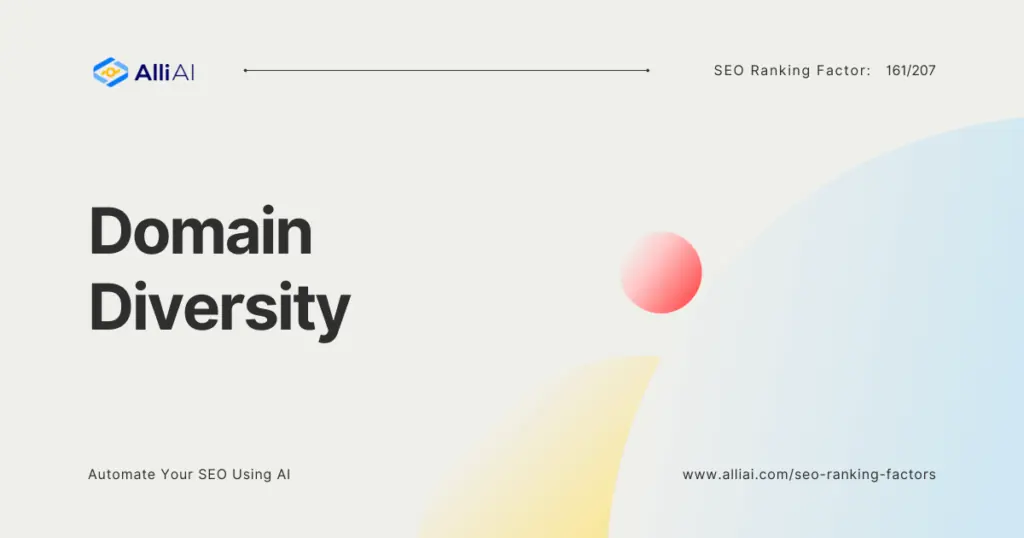What is Domain Diversity?
Imagine attending a party where everyone is from the same small town. Sure, you might have fun, but the conversation is likely to lack a certain spark. Now, picture a gathering where guests hail from all corners of the globe – doctors, artists, entrepreneurs, adventurers. Suddenly, the room crackles with energy as diverse perspectives collide and new ideas ignite.
This is the power of diversity, and it applies to the digital world as much as it does to social gatherings. In the realm of SEO, domain diversity – the variety of unique domains that link to your website – can be the difference between blending in and standing out.
Why is Domain Diversity Important in SEO?
Search engines like Google are constantly refining their algorithms to deliver the most relevant and valuable results to users. One of the many factors they consider is domain diversity. Why? Because a website with backlinks from a broad range of domains signals something crucial to the search engine:
- Credibility: If multiple reputable sources from different corners of the internet find your content valuable enough to link to, it’s a strong indicator that your information is trustworthy and authoritative.
- Relevance: Diverse backlinks often mean your content appeals to a wider audience and covers a broader range of topics, making it more likely to be relevant to various search queries.
- Natural Link Profile: Search engines are adept at spotting unnatural link patterns (e.g., buying links). A diverse backlink profile that organically develops over time is a sign of genuine popularity and quality.
How Domain Diversity Affects SEO: The Impact Revealed
Domain diversity affects SEO in multifaceted ways. Websites with backlinks from a broad spectrum of domains are often ranked higher than those with numerous links from a few domains. This diversity indicates to search engines that a wide array of sources find the content valuable, hence improving its SERP ranking.
Link Diversity: A study by Ahrefs found that a correlation exists between the number of referring domains and a website’s position in SERPs. Websites with links from various domains tend to rank higher than those with equal or greater total backlinks but less domain diversity.
Trust and Authority: Moz’s Domain Authority metric highlights the importance of link diversity. Sites with higher Domain Authority, often resulting from diverse backlinks, tend to rank higher on Google.
These statistics underscore the importance of cultivating a backlink profile enriched with domain diversity. Diversification not only enhances the credibility of a website but also its search engine ranking and visibility.
A site with 100 backlinks from 10 different domains will typically have a higher DR or DA than a site with 100 backlinks from only 5 domains. This is because the diverse backlink profile indicates a wider endorsement and greater authority.
FAQ
How can I improve my website’s domain diversity?
Improving domain diversity involves earning backlinks from new, authoritative domains. Strategies include creating high-quality, link-worthy content, guest posting on reputable sites, and engaging in industry forums and discussions to attract links from varied sources.
Does domain diversity include both follow and nofollow links?
Yes, while follow links transfer link equity and contribute more directly to SEO, nofollow links also play a role in domain diversity. They indicate to search engines the broad endorsement of your site, contributing to a natural and diverse link profile.
Is there such a thing as too much domain diversity?
While domain diversity is generally positive, artificially inflating your backlink profile with low-quality or spammy sites can harm your SEO. Aim for quality over quantity, focusing on earning links from reputable, high-authority domains.
Strategies for Enhancing Domain Diversity
To improve your site’s domain diversity, consider the following tactics:
- Digital PR: Engage with digital PR campaigns to earn mentions and links from various news outlets and blogs across different industries.
- Content Marketing: Create and distribute valuable, shareable content that naturally attracts links from a multitude of domains.
- Strategic Partnerships: Collaborate with other businesses and platforms to get your content linked from diverse domains in relevant contexts.
Conclusion
In conclusion, domain diversity is a cornerstone of effective SEO strategies. Much like a well-attended party draws interest, a website with a diverse range of referring domains attracts attention from search engines, enhancing its authority, trustworthiness, and, ultimately, its ranking in search results. Fostering domain diversity requires effort and strategy but is undeniably rewarding. By understanding its importance and implementing tactics to improve it, businesses can significantly improve their online visibility and success.






